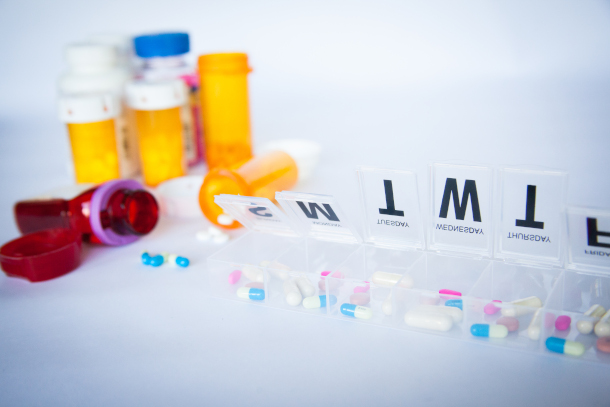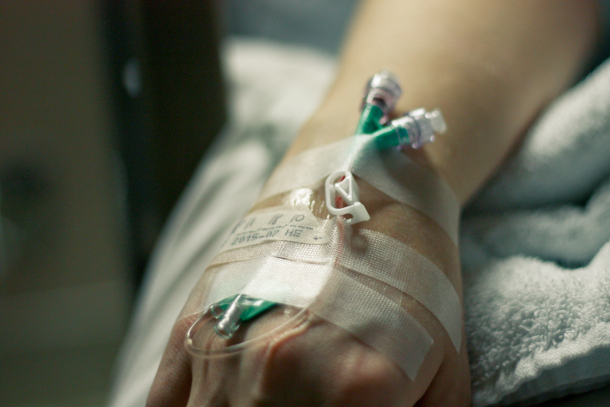Medical Plastic Linked to Breast Cancer Relapse
Air Date: Week of August 12, 2022

DEHP is a common phthalate found in medical devices that can interfere with the effectiveness of certain cancer treating drugs. (Photo: franchise opportunities, Flickr, CC BY 2.0)
Breast cancer is the leading cause of cancer death among women worldwide, and endocrine disrupting chemicals are partly to blame. One such chemical is DEHP, a phthalate chemical commonly used in plastic hospital intravenous bags and medical tubing, and studies have shown that it’s interfering with breast cancer treatment and augmenting the odds of relapse. Pete Myers, the founder and chief scientist of Environmental Health Sciences, talks with Host Steve Curwood about the study findings and how to protect patients from harm caused by endocrine disrupting chemicals.
Transcript
DOERING: It’s Living on Earth I’m Jenni Doering
CURWOOD: And I’m Steve Curwood.
Breast cancer is the leading cause of cancer death among women worldwide, and except in the most affluent nations, death rates keep rising. In the US, where one out of eight women will get breast cancer in her lifetime, survival rates are better, thanks to screening and advanced chemotherapy and hormone treatments. But even in rich nations there are some breast cancer cases that are stubbornly resistant to chemo and hormone therapies, and thus are more likely to spread and recur. Now some government-funded researchers in Taiwan think they may know why.
They say a chemical commonly used in Intravenous bags and medical tubing may actually be making breast cancers worse. This chemical is a form of phthalates known by its initials, DEHP, and like many other phthalates, DEHP is an additive used to make plastics soft and pliable. Science already knows DEHP and other phthalates are linked to a variety of disorders from obesity to neurological development problems. And these chemicals enter our bodies in many ways including from a number of cosmetics and fast foods. And now with this recent finding, the health care system itself is implicated in the breast cancer epidemic, with evidence the plastic additive DEHP leached from IV bags and medical tubing can help breast cancer cells evade chemotherapy treatments. Joining us now is Pete Myers, founder and chief scientist of Environmental Health Sciences, a partner of EHN.org and dailyclimate.org. He joins me now. Welcome back to Living on Earth, Pete!
MYERS: Hi, it's great to be back, Steve, nice to see you.
CURWOOD: So, what did these researchers in Taiwan find out about DEHP and breast cancer?
MYERS: Well, their previous research, which was really interesting and suggestive, indicated that DEHP affects drug resistance, it reduces the effectiveness of certain drugs that are used to treat breast cancer. And what they did, with this paper, is they tried to figure out why that happened. This paper first confirmed their original findings. Patients with higher levels of DEHP don't respond as well to breast cancer treatment drugs, tamoxifen, and doxorubicin. Women who have had breast cancer in the past, are more likely to have it again, when they have higher levels of DEHP. But also, they found that women with higher levels are more likely to die. They have later stage tumors, the tumor sizes are larger. And this was all from the epidemiology, which was the first part of this study. They then did a series of cell and animal tests to figure out, what are the mechanisms that are causing that.
CURWOOD: And the answer is?
MYERS: Well, it's actually kind of clear, they used a classic breast tumor cell line series, and they showed that DEHP inhibits two drugs specifically, as I mentioned, tamoxifen and doxorubicin. And not only did they find that in the human breast tumor cell lines, they found that the same thing happens in the zebrafish model and a mouse model. What is causing this is that the DEHP turns on genes that produce enzymes that increase the degradation rate of the cancer treating chemicals. What this means is every time a person is being treated for breast cancer, and they're being infused with chemicals through IV tubes, what leaches out of the IV tubes is damaging the treatment program.
CURWOOD; So, it's as if the DEHP provides a defense for the cancer. Let me help you stay growing, Mr. Cancer or Ms. Cancer!
MYERS: Yeah, and one of the more interesting findings in these experiments was that DEHP turns on a gene, which geneticists call TFF-3, that actually speeds up the proliferation, invasion, metastasis, and drug resistance.
CURWOOD: Pete, this is somewhat, what's old is new again. I mean, some 30 years ago, Ana Soto at Tufts noticed that experimental breast cancer cells in test tubes were growing faster. She was puzzled by that till she realized, of course, it was related to the plastic.

Most medical tubing made from plastic like intravenous bags and tubing contain the phthalate chemical DEHP to make them malleable. (Photo: Bart Heird, Flickr, CC BY-NC-ND 2.0)
MYERS: It was a different plastic, but that's exactly right. And this raises the possibility that these findings that were just reported from Taiwan, that do remind us of Ana Soto's work, and Carlos Sonnenschein's, this may be the tip of the iceberg. How many other pharmaceuticals are impeded by DEHP action? And how many endocrine disrupting compounds interfere with pharmaceutical treatments? This is a really important set of questions that have barely been addressed by the medical community. And if it's true, if these results are replicated, it raises the ante on moving forward with this research.
CURWOOD: I mean, to what extent are the endocrine disrupting chemicals posing a health emergency for us?
MYERS: Well, they've been around a long time. So, it's, it's not like the classic emergency where something has just emerged. What this really represents, I think, is a healthcare opportunity. Because we can, if we begin to act on this, we can begin to decrease the mortality rate and the recurrence rate of breast cancer in women. And that would be a great outcome.
CURWOOD: Now, one does not want to needlessly extrapolate. But how relevant do you think this research is to the whole business of cancer in humans?
MYERS: Well, there are so many, so many variables in that question, Steve, I don't really have the complete answer to that. I can tell you this: that most of the professional organizations like the American Cancer Society have completely ignored the potential contribution of chemicals to causing cancer. They've got to start focusing on that because it's very clear that chemicals do contribute both to the causation and the promotion of cancer. And now we're learning that they also contribute to undermining the treatment programs that they themselves have been responsible for developing. So, they can't continue to ignore this.
CURWOOD: And by the way, just how widespread is DEHP in IV bags and tubing?
MYERS: It's probably in about 80% of IV bags and tubing used in hospitals around the world. There was an effort 20 years ago, to replace DEHP, but it fell short because they discovered that the replacement that was available at the time, led the bags that were used to be weaker. And nurses said, I don't want to use a weaker bag, I need to have a strong bag. And the science on DEHP's contribution was still in development. Now we know how imperative it is that DEHP be replaced, and there are companies working to do that right now. But they, they've got to do this not by pulling a replacement off the shelf and substituting it without testing it, because that's been one of the long-term problems, this field has faced. When you find out that you've got to replace a chemical, you can't just pull a substitute off the shelf, because in all likelihood, that chemical on the shelf has been tested using the same flawed testing procedures that led to the bad thing in the first place. We've got to go and help green chemistry, sustainable chemistry, develop real substitutes. And that's going to involve real testing. If you don't test, you don't know whether or not you have a substitute that you're going to regret.
CURWOOD: Pete, what personal experience, if any, do you have dealing with hospitals and patient care that give you concern about the way DEHP can be in, in the plastics that are used?

Phthalates are commonly found in plastic food packaging and materials used to handle and process food. (Photo: Daniel Orth, Flickr, CC BY-ND 2.0)
MYERS: Well, I should say that I, I'm getting to the age now where I have to deal with hospitals, myself. And that's opened my eyes to how widespread plastics are. But in particular, I have a granddaughter who's three now and she wound up being born prematurely, two months premature and spent the first two months of her life in the neonatal intensive care unit. And as I would go in to see her and hold her, I would see all these plastics, all over the NICU, the neonatal intensive care unit. And I've been working with endocrine disrupting compounds now for 30 years. So, I know what it means to have an IV system, an IV bag or tube, laced with DEHP. I know the threats that it creates for her long-term health. So, I'm looking at that; I'm thinking, what can I do? At the same time, I'm realizing without those plastics now, she probably wouldn't have lived, because the plastics allow doctors to do miracle things. We've created a conundrum, Steve; it's, it's very troubling, where we, because we developed plastics in an era when this science was nonexistent, we didn't understand the threats that endocrine disrupting chemicals create for people's health, we let plastics and poorly designed plastics that weren't tested adequately become ubiquitous in healthcare. So now what we've got to do is we've got to systematically rethink, which of those plastics are important? How can we redesign the ones that are important so that they don't cause endocrine disrupting problems? And thirdly, we have to think about having the FDA reform the way that it regulates endocrine disrupting compounds throughout society. It's not doing its job.
CURWOOD: So, what's a person to do, most likely a woman who has breast cancer and is getting treated and getting chemotherapy in this equipment? What is she to do in light of this knowledge that these things are supposed to be helping her, but maybe they're making her cancer worse?
MYERS: That's a question that we can't answer right now, Steve. There is no replacement that's ready to slip in. Sustainable chemistry, green chemistry takes time. And so, I guess what I would do if that were me -- and my wife actually had breast cancer, so I've experienced the hospital from that perspective. I didn't know this specific study at the time, but I knew that, actually, I would ask the physician if he was aware, or she, that Bisphenol A interferes with breast cancer treatment, because that study came out about 10 years ago. And that would shock them. And so, I would say, they should ask every person that's involved in their health care, is this an essential use of polyvinyl chloride plastic? If it's an essential use, then how can we minimize it? Because those, those drugs that they're getting, they do increase the chances of recovery. But we also know that failure of the drugs in treatment are causing a significant amount of harm as well. And now we know, we think we know, one of the reasons why that treatments sometimes fail. But there's no easy answer, Steve, it's a, it's a problem that's been building for decades. And we haven't been willing as a society to make the investments to create the new chemicals, which we can do, because we know enough about endocrine disrupting mechanisms that we can design things that don't do it and gradually replace that stuff that's in the hospitals with material that's safer. We have to get people demanding that research be supported and demanding to the hospitals that they push to have the replacements available as quickly as possible.
CURWOOD: Pete Myers is the founder and chief scientist of Environmental Health Sciences. Thanks so much for spending the time with us today, Pete! Great to have you on again.
MYERS: Excellent to see you.
Links
EHN | “Plastic Additive Increases Breast Cancer Relapse, Mortality: New Science”
ScienceDirect | “DEHP Mediates Drug Resistance by Directly Targeting AhR in Human Breast Cancer”
Living on Earth wants to hear from you!
Living on Earth
62 Calef Highway, Suite 212
Lee, NH 03861
Telephone: 617-287-4121
E-mail: comments@loe.org
Newsletter [Click here]
Donate to Living on Earth!
Living on Earth is an independent media program and relies entirely on contributions from listeners and institutions supporting public service. Please donate now to preserve an independent environmental voice.
NewsletterLiving on Earth offers a weekly delivery of the show's rundown to your mailbox. Sign up for our newsletter today!
 Sailors For The Sea: Be the change you want to sea.
Sailors For The Sea: Be the change you want to sea.
 The Grantham Foundation for the Protection of the Environment: Committed to protecting and improving the health of the global environment.
The Grantham Foundation for the Protection of the Environment: Committed to protecting and improving the health of the global environment.
 Contribute to Living on Earth and receive, as our gift to you, an archival print of one of Mark Seth Lender's extraordinary wildlife photographs. Follow the link to see Mark's current collection of photographs.
Contribute to Living on Earth and receive, as our gift to you, an archival print of one of Mark Seth Lender's extraordinary wildlife photographs. Follow the link to see Mark's current collection of photographs.
 Buy a signed copy of Mark Seth Lender's book Smeagull the Seagull & support Living on Earth
Buy a signed copy of Mark Seth Lender's book Smeagull the Seagull & support Living on Earth

